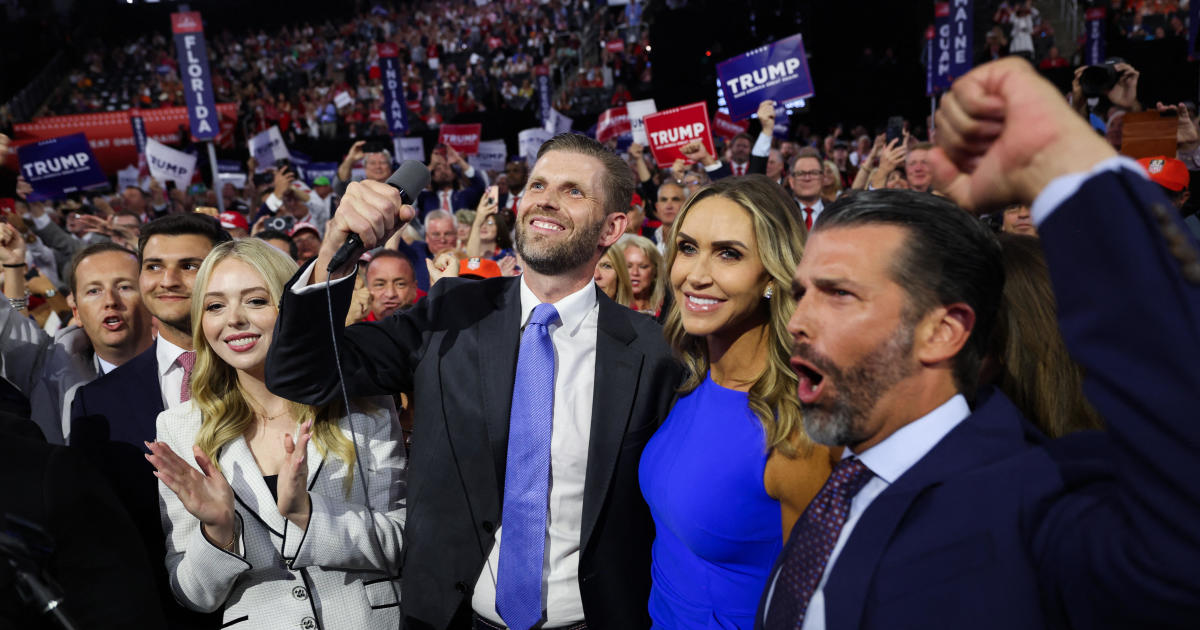Washington — Republican governors, lawmakers and nearly 2,500 delegates are convening in Milwaukee, Wisconsin, for the Republican National Convention, with former President Donald Trump formally receiving the party’s 2024 nomination for president during a roll call vote of the state delegations Monday.
The roll call brings to an end the GOP presidential primary, though it’s been known for months that Trump would be the party’s choice to take on President Biden in November. The former president clinched the nomination in March, after he secured the 1,215 Republican delegates needed to become the presumptive GOP presidential nominee.
Trump announced Ohio Sen. J.D. Vance as his vice presidential running mate as the roll call was underway. Trump will also deliver a speech formally accepting the Republican presidential nomination to close out the convention Thursday.
With the announcement of Florida’s 125 votes for Trump, delivered by his son, Eric Trump, the GOP officially nominated him for president. Eric Trump was accompanied by Donald Trump Jr., the former president’s eldest son, and Tiffany Trump, his daughter.
House Speaker Mike Johnson, who is chair of the convention, announced at the conclusion of the roll call that 2,387 votes were cast for Trump.
“Let’s make it official,” he said. “Accordingly, the chair announces the President Donald J. Trump, having received a majority of the votes entitled to be cast at the convention, has been selected as the Republican Party nominee for president of the United States.”
Results of the RNC roll call of states for 2024
State delegations announced their votes for the presidential nomination. Here is the breakdown of votes from each state and territory:
- Iowa: 40 votes for Trump
- Nevada: 26 votes for Trump
- Oklahoma: 43 votes for Trump
- West Virginia: 32 votes for Trump
- New Hampshire: 22 votes for Trump
- Nebraska: 36 votes for Trump
- California: 169 votes for Trump
- Tennessee: 58 votes for Trump
- Washington state: 43 votes for Trump
- Alabama: 50 votes for Trump
- Massachusetts: 40 votes for Trump
- Indiana: 58 votes for Trump
- Georgia: 59 votes for Trump
- Utah: 40 votes for Trump
- Maryland: 37 votes for Trump
- Texas: 161 votes for Trump
- Ohio: 79 votes for Trump
- American Samoa: 9 votes for Trump
- Wisconsin: 41 votes for Trump
- New York: 91 votes for Trump
- Florida: 125 votes for Trump
- Puerto Rico: 23 for Trump
- Kentucky: 46 votes for Trump
- Hawaii: 19 votes for Trump
- Kansas: 39 votes for Trump
- Louisiana: 47 votes for Trump
- Delaware: 16 votes for Trump
- Guam: 9 votes for Trump
- Connecticut: 28 votes for Trump
- Alaska: 29 votes for Trump
- Oregon: 31 votes for Trump
- Mississippi: 40 votes for Trump
- Northern Mariana Islands: 9 votes for Trump
- Wyoming: 29 votes for Trump
- Maine: 20 votes for Trump
- Missouri: 54 votes for Trump
- Idaho: 32 votes for Trump
- Illinois: 64 votes for Trump
- North Dakota: 29 votes for Trump
- Arizona: 43 votes for Trump
- New Jersey: 12 votes for Trump
- U.S. Virgin Islands: 4 votes for Trump
- North Carolina: 62 votes for Trump; 12 votes to be cast pursuant to convention rules
- Arkansas: 40 votes for Trump
- Virginia: 42 votes for Trump; 6 votes to be cast pursuant to convention rules
- Michigan: 51 votes for Trump; 4 votes to be cast pursuant to convention rules
- Minnesota: 39 votes for Trump
- Colorado: 37 votes for Trump
- Rhode Island: 19 votes for Trump
- Pennsylvania: 67 votes for Trump
- South Dakota: 29 votes for Trump
- New Mexico: 22 votes for Trump
- Montana: 31 votes for Trump
- South Carolina: 50 votes for Trump
- Vermont: 17 votes for Trump
- Washington, D.C.: 19 votes to be cast pursuant to convention rules
How does the RNC’s roll call of states work?
During the roll call, the head of each state’s and territory’s delegation was called on to announce the votes of their state or territory’s respective nomination for president. If a state delegation had passed when its name is called, it will be called again at the conclusion of the roll call.
Delegates are selected to represent their state or area at the convention, and most of those are bound to back Trump, as they’re required to vote in accordance with the outcome of their state’s primary or caucus. Roughly 150 delegates were unbound heading into the convention, since a small number of delegations, including those from Montana, New Mexico and South Dakota, were not required to vote for their state’s chosen candidate.
Trump came into the convention with an estimated 2,243 delegates based on the results of primaries and caucuses held earlier this year, according to the CBS News Delegate Tracker.
What happens to delegates for candidates who have dropped out?
Though Trump cruised to victory during the primary elections, his former rival in the race, Nikki Haley, secured 94 delegates, according to the Delegate Tracker. Haley’s campaign said she earned 97 delegates during the primary process.
But Haley announced last week she would be releasing those delegates and encouraged them to vote for Trump at the convention. State party rules dictate whether Haley’s delegates are bound to her or whether they’re free to vote for a different candidate since she withdrew from the presidential contest.
In Iowa, for example, Trump, Haley, Florida Gov. Ron DeSantis and biotech entrepreneur Vivek Ramaswaky secured delegates after the caucuses. But under state party rules, since Trump was the only candidate nominated at the convention, the entire 40-person delegation voted for him.
#full #RNC #roll #call #states #vote #results #Republican #nomination,
#full #RNC #roll #call #states #vote #results #Republican #nomination
